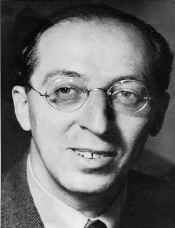|
Makers
Violin History & Timeline
PERFORMERS
Violin
Viola
Cello
Bass
Gamba, etc.
The Roots of Famous Violinists
TEACHERS
Violin
Viola
Cello
Bass
DEALERS
Listings
Specialist
Event
LUTHERIE
Bibliography
Listings
Gallery
COLLECTING
Identification
Buying
Selling
THE INSTRUMENTS
Violin
Viola
Cello
Bass
Viol
Bows
Tales
LINKS
Interesting Sites
GALLERY
Antique Instruments
Historical Photos
|
|
 Aaron
Copland was born in New York at the turn of the century, and developed a
uniquely American compositional style. Although his older brother and
sister had been given music lessons, Coplandís family did not have a
great proclivity towards music. In fact, Coplandís parents initially
denied him music lessons as they felt that their older children had not
benefited from the study of instruments. Thus, Copland began studying
the piano at the late age of fourteen. His sister introduced him to the
piano, and Copland soon surpassed her
skills. He studied on his own for a year and a half, and then beseeched
his parents to hire a music teacher. After studying with a local
teacher, Copland made arrangements to take a course in harmony from
Rubin Goldmark, a renowned theoretician. Around the age of sixteen, he
had begun to develop a great interest in composition. Aaron
Copland was born in New York at the turn of the century, and developed a
uniquely American compositional style. Although his older brother and
sister had been given music lessons, Coplandís family did not have a
great proclivity towards music. In fact, Coplandís parents initially
denied him music lessons as they felt that their older children had not
benefited from the study of instruments. Thus, Copland began studying
the piano at the late age of fourteen. His sister introduced him to the
piano, and Copland soon surpassed her
skills. He studied on his own for a year and a half, and then beseeched
his parents to hire a music teacher. After studying with a local
teacher, Copland made arrangements to take a course in harmony from
Rubin Goldmark, a renowned theoretician. Around the age of sixteen, he
had begun to develop a great interest in composition.
Although Goldmark introduced Copland to the
ftmndamentals of composition and harmony, Goldmark was not open to
modern forms of musical expression. Therefore, he did not encourage
Coplandís initial works. After completing high school, Copland looked
to Europe as the site of musical education. He applied to a new American
music school in France, and was the first pupil to be accepted.
Initially, Copland found the academic overtones at the Fontainebleu
Conservatory to be aggravatingly stuft~,í. However, he soon took a
class from Nadia Boulanger, a harmony instructor, under whose direction
Coplandís abilities burgeoned. Although it was unusual for a musician
to study under a woman, Copland found Boulanger to be receptive to the
novelty of contemporary music. He discovered the growth of modern
styles, and experimented with his own musical preferences. Boulanger
supported Coplandís desire to become a composer, and when he completed
his three year course at the conservatory, he returned to New York with
a commission from Boulanger to write a
symphony.
In 1924 the League of Composers accepted and
performed Coplandís music for an upcoming concert. This was the first
time that Coplandís music was performed in the United States. Serge
Koussevitzky, the director of the Boston Symphony Orchestra, became an
avid supported of Coplandís works, and continually encouraged him to
write new pieces that the Boston Symphony would then perform.
By the age of twenty-five, Coplandís work was well
recognized, but he was unable to support himself financially.
Fortuitously, he won the Guggenheim Fellowship, enabling him to spend
two years without financial obligations. Free to concentrate on
composing, he began to write prolifically. In the 1930s Copland began
examining his works, and decided to establish a simpler, clearer
compositional style that would be more accessible to all audiences.
During a significant visit to Mexico City, Copland heard some
native dance tunes that he then incorporated into a symphony. He went on
to include American folk songs into his music, establishing a decidedly
unique compositional style that was beloved by his audiences. He wrote
pieces for people from all walks of life, producing operas, radio music,
and motion picture theme songs.
Copland emphasized the importance of encouraging
other composers to produce new music. He founded the Copland-Sessions
concerts and the Yaddo Festival, and worked with the National Society
for Contemporary Music. Additionally, Copland became a renowned speaker
on musical composition and development. He was granted a doctorate from
Princeton, and became a lecturer at Harvard. In addition, President
Johnson awarded him the Medal of Freedom in recognition of his patriotic
music. A man who transcended the bounds of musical tradition, Copland
received the Pulitzer Prize in music. A much celebrated composer,
Copland transformed American music, going beyond accepted compositional
forms, and discovering an untapped world of beauty and harmony.
Notes by Shanaira Udwadia (June-2001) |